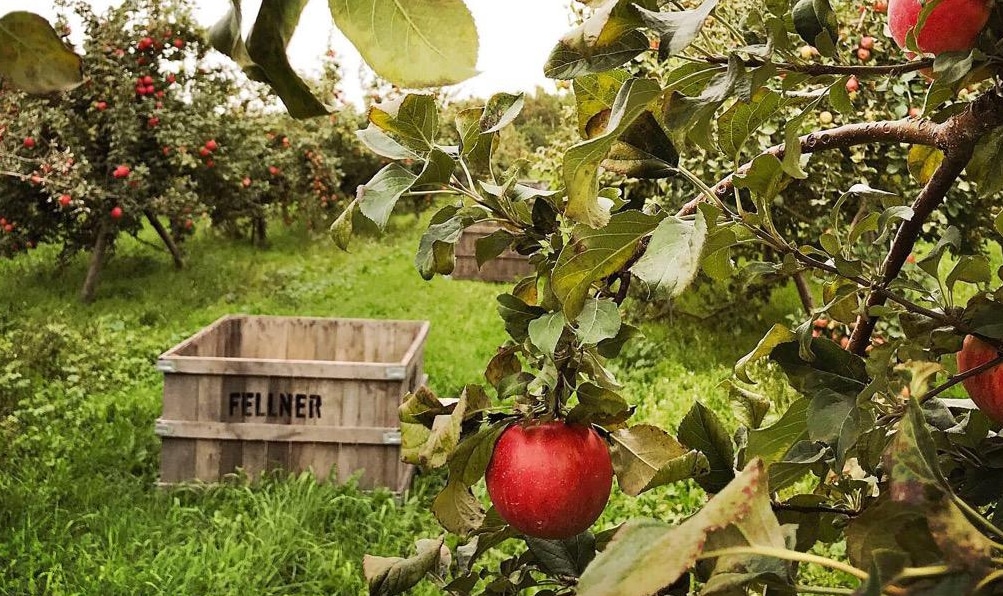Growing apples is extremely difficult. It requires intense knowledge of the land and the mercy of the constantly fickle weather. So much of the process is at the behest of mother nature herself.
Tucked back in the corner of one of America’s so-called “fly over states” is the idyllic peninsula of Door County, Wisconsin.
This remote part of the state juts out into Lake Michigan, a narrow strip of land only 80 miles long and tapering from 25 miles to a mere two miles wide at its narrowest point. This county I consider to be one of America’s best kept secrets. The coastline of the Peninsula is a mix of long white sand beaches and rolling feather-grass covered dunes reminiscent of those one would find in the Hamptons or Cape Cod. Carved by ancient glaciers, where the beaches end, chalk white limestone cliffs emerge creating a silhouette similar to that of the cliffs of the Amalfi Coast. Built in between these beaches right on the bank of the lake are charming little towns that overlook sail boat dappled harbors and the rolling hills of the Northern Wisconsin countryside. The weather in the summer hangs around a sunny and arid 75 degrees F. and every night on the Green Bay side of the peninsula, you can watch as the sun sinks low and disappears directly into the waves on the lake.
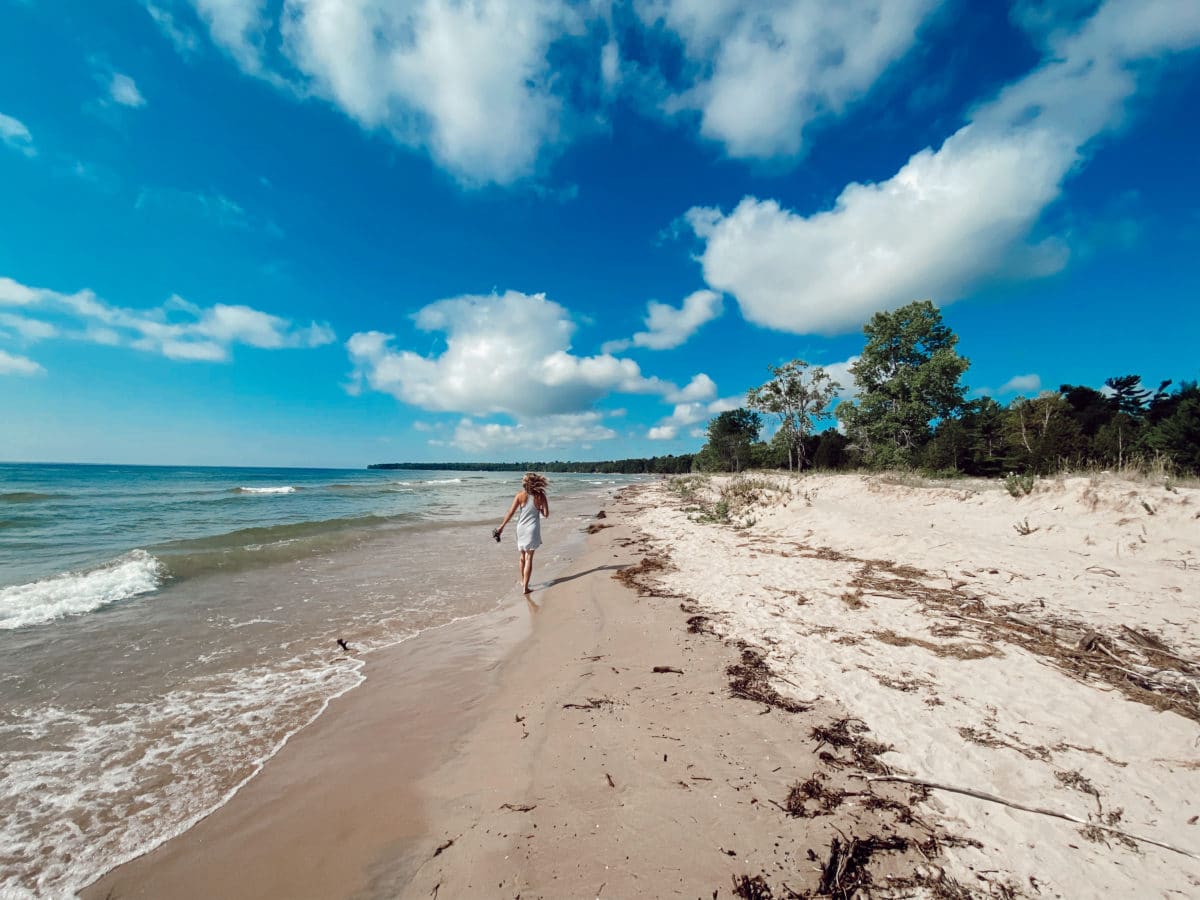
Wisconsin is most known for being the dairy state and for many, images of the iconic Green Bay Packers and fans adorning their heads with hats that look like giant wedges of cheese. However, football and milk products are only a sliver of what there is in Wisconsin. Door County in particular is known for their cherries. And though it is true that much of the farmland in the county is made up of cherries (and they are as delicious as their fame would suggest!), personally, I am partial to Door County apples.
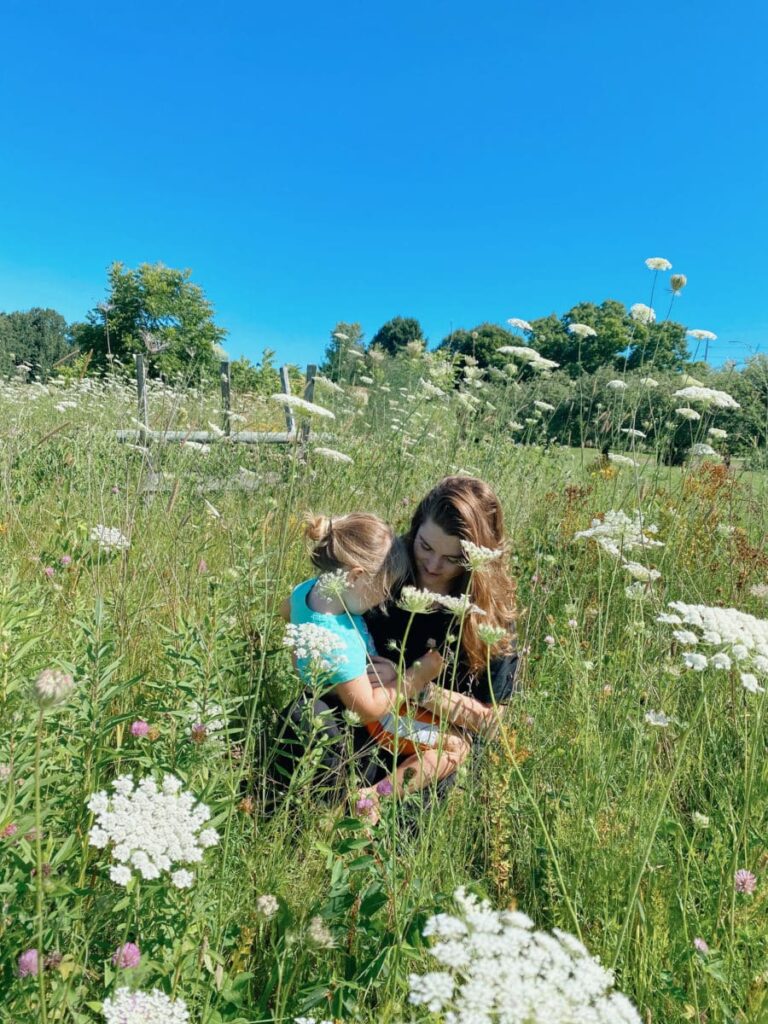
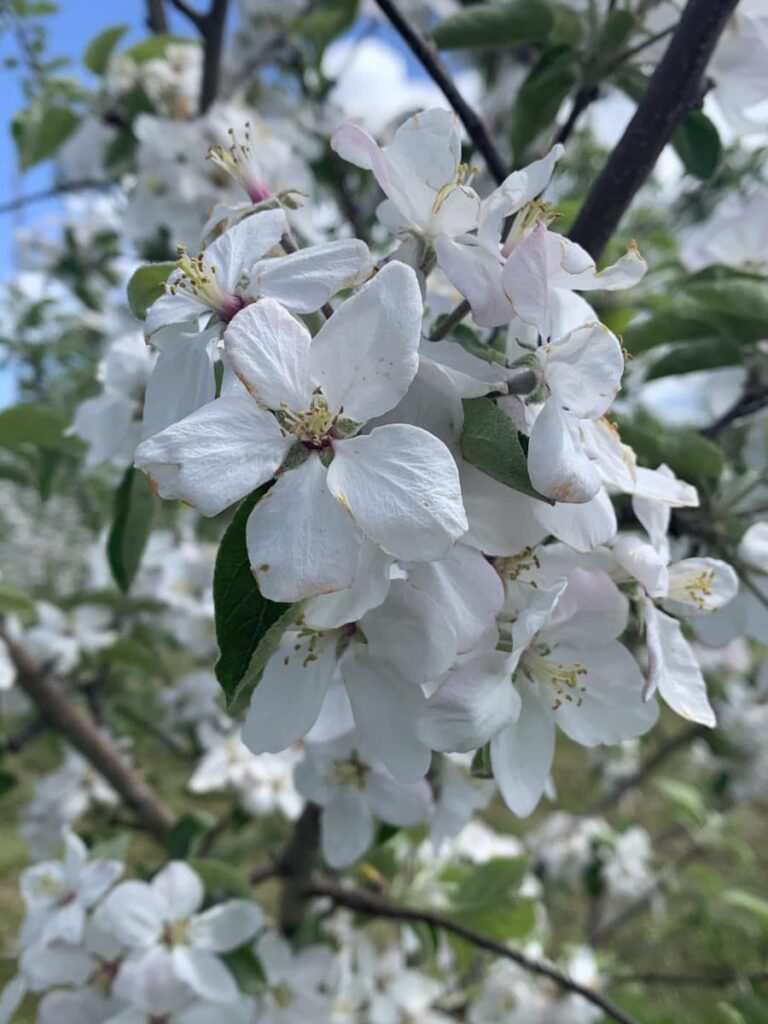
Situated at the base of the peninsula is a small town called Sturgeon Bay.
There’s an infamous street in the town called Cherry Road but today, you won’t find many cherry trees. Much of the road is lined with rows and rows of ancient apple trees. Fellner Orchards has been a thriving and operational farm for nearly 100 years and I am lucky enough to consider it home. The actual orchard has existed on the land since the 1800s. In 1923 Clara and Joe Fellner, my great grandparents, fell in love with their dream and felled roots lasting for the next 100 years. The farm was taken over by my grandmother and late grandfather, Grace and Robert Fellner in the 1970s. Today, the farm consists of almost 100 acres of land and is exclusively apples: apples as far as the eyes can see. The ever classic Macintosh apples along with Cortlands, Golden Delicious, Ida Reds, Wealthies, and my personal favorite: Honey Crisps abound on trees that are only a few years old to the ones planted by my great grandparents over 100 years ago.
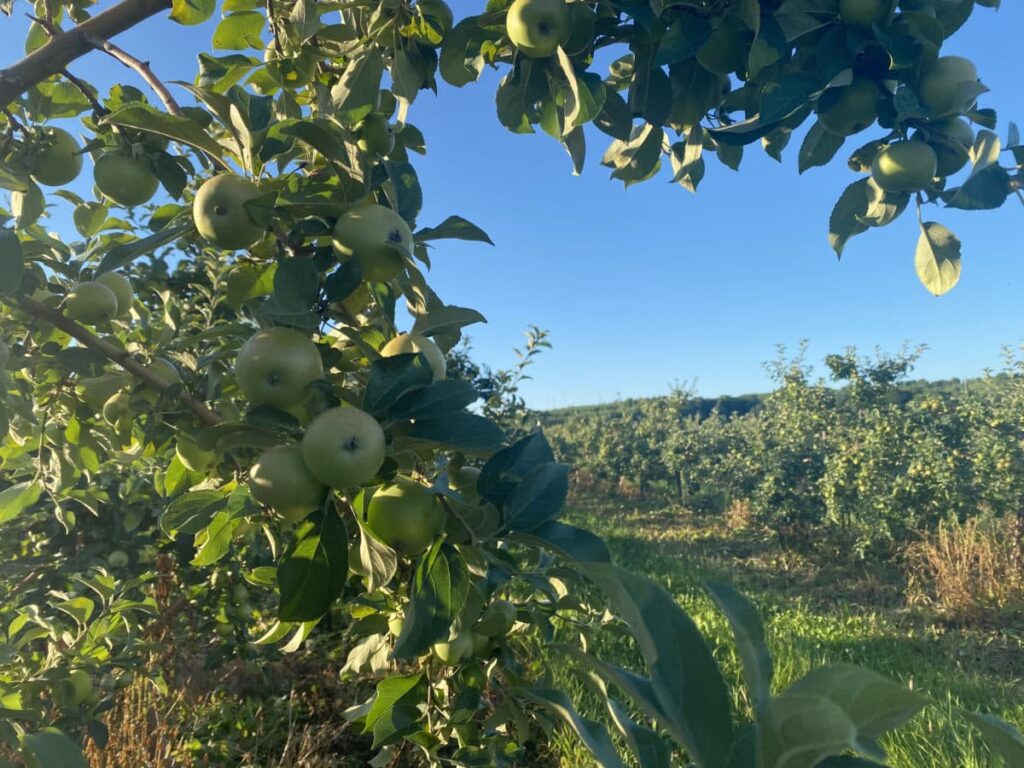
An apple tree needs 15 years or more to produce enough apples to cover the cost of the tree and its maintenance so it is extremely important to tend the trees properly to ensure that the tree lives a long and prosperous life and is decorated with stunning, delicious apples every fall. Nothing produces more delicious apples than those trees grown in healthy soil. Wisconsin’s soil makeup is rich with limestone that plants love . It’s no wonder that the agricultural makeup is so prosperous.
That being said, there is no formula for “the perfect soil” for all apple trees. Each variety of apple needs different minerals and elements to achieve that perfect crunch of sweetness to tartness ratio that makes us all adore this fruit so much.
Every year, the soil is tested and the exact minerals are delicately sprinkled into the soil. The orchard is divided up by apple variety so samples are taken from all across the land to determine what each individual row needs to grow and thrive. They also practice polyculture which is an ancient farming practice of growing multiple crops at the same time. Plants do take nutrients from the soil but they also replace certain elements as well. Polyculture is not only an efficient use of the land, it is also a way for one plant to feed another and vice versa. Nature has known that fact forever but us humans are finally getting back to these tried-and-true practices. Today, the orchards are bordered by lush stocks of purple clover that my cousins and I pick to try and get a taste of the sweet nectar that the petals hold on their ends.
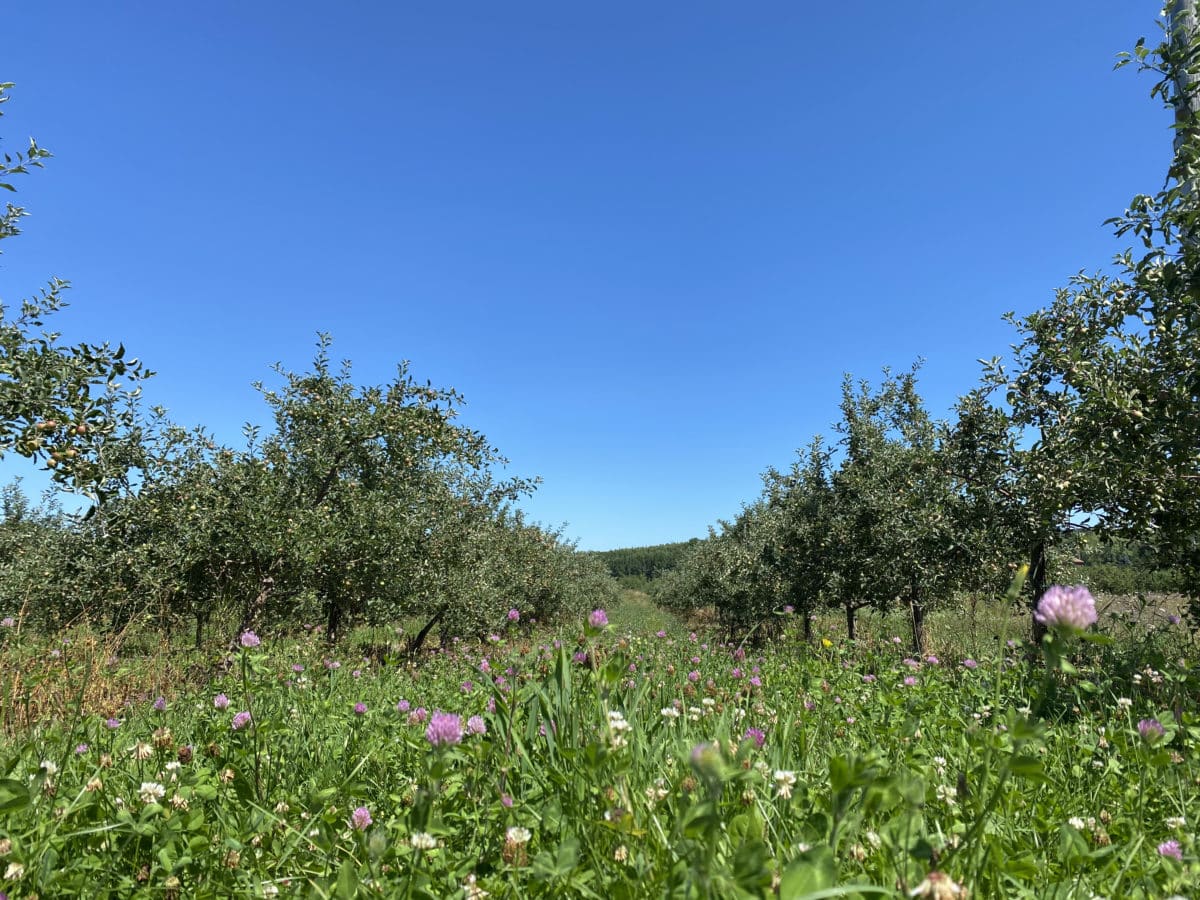
Long before I was born, there were in fact cherry trees but there were also raspberries, blueberries, and strawberries. These berry bushes were planted in between the rows and rows of apples and cherries. All summer long, my mom, her three sisters and their baby brother would spend hours and hours picking berries in the sun to earn spending money for the county fair every August. No matter the season, my grandmother could be seen, looking chic as ever in cutoffs, heading up to the orchard trailed by four darling girls with their hair tied up in french braids. Fellner Orchards is not only a family run business it is also so much of a community. All five of the Fellner kids would help to pick apples every fall, and berries and cherries every summer. Every fall my grandparents employed people from all around the county to pick apples.
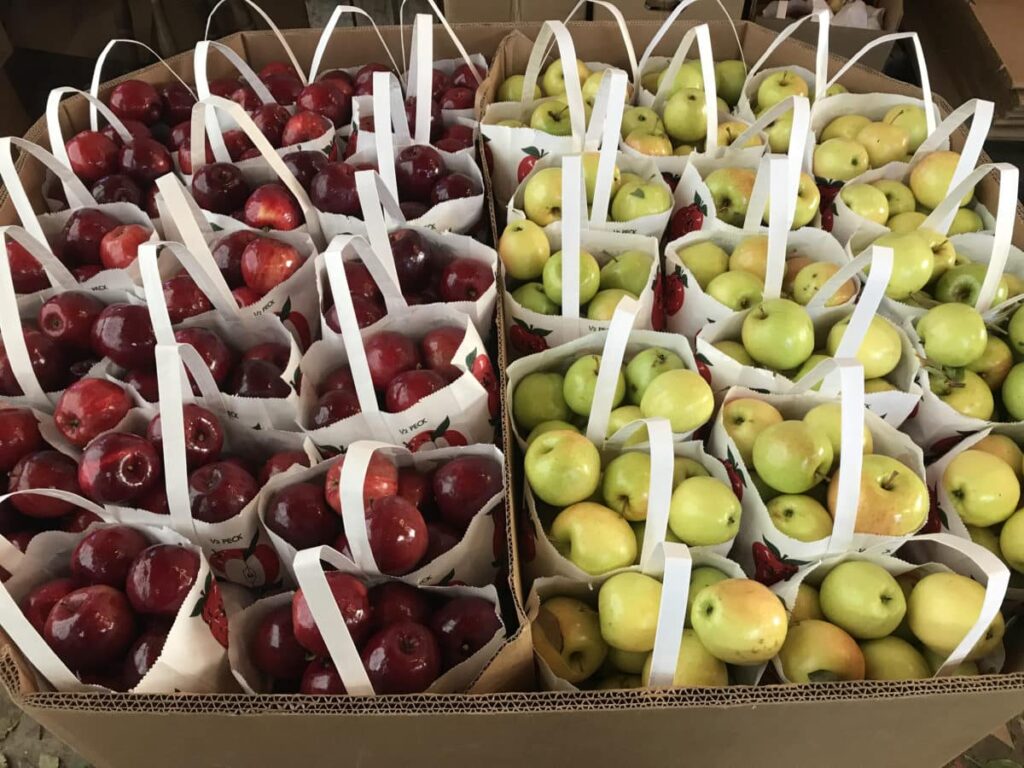
Every time I’m in the car with my grandma she points to nearly every house and says, “they picked apples for us.” People would come from all around to help with the crop. Parents would bring their young children and as the adults picked, the kids were free to roam around the trees barefoot and sampling apples straight from the trees. As fall gives way to the windy Midwestern Winter, it is time for the apples to be bagged to get ready to be shipped out. Fellner Orchards are actually the originators of bagged apples in the state of Wisconsin.
Close friends and family would all gather in the bagging shed to help out. There, the hours are passed with singing and chatting and telling stories.
My grandfather was a great lover of literature and would often recite poetry; Robert Service and Robert Frost were two of his favorites.
Our faults no tenderness should ask,
The chastening stripes must cleanse them all;
But for our blunders–oh, in shame
Before the eyes of heaven we fall.”
~The Fool’s Prayer by Edward Roland Sill
Of my Grandpa’s favorite poems he memorized every single line. Even into his final years, I remember him sitting back in his chair, head back, arms folded over his chest carefully speaking each line in his gravely baritone voice that could bring an entire room to complete silence.
My grandfather was a man who knew everything about everything. He was a naturalist, an intellectual, and an engineer. Knowing this much is required to successfully run a farm.
Growing apples is extremely difficult. It requires intense knowledge of the land and the mercy of the constantly fickle weather. So much of the process is at the behest of mother nature herself.
There are the gorgeous bumper crop years when the orchard is bathed in a sea of delicious red and the winter is spent enjoying a much needed rest after the hectic fall. But there are also years when the weather is not so forgiving. Those years, my grandfather would pick up hours at the shipyard and my grandmother would work for the Jellystone Parks answering phones and filing paperwork. They would do all that was in their power to prepare for the next season and hope for rain and fair weather. In the summer of 2014, there was a freak hail storm that wiped out almost half of the trees on the farm. But what can you do?
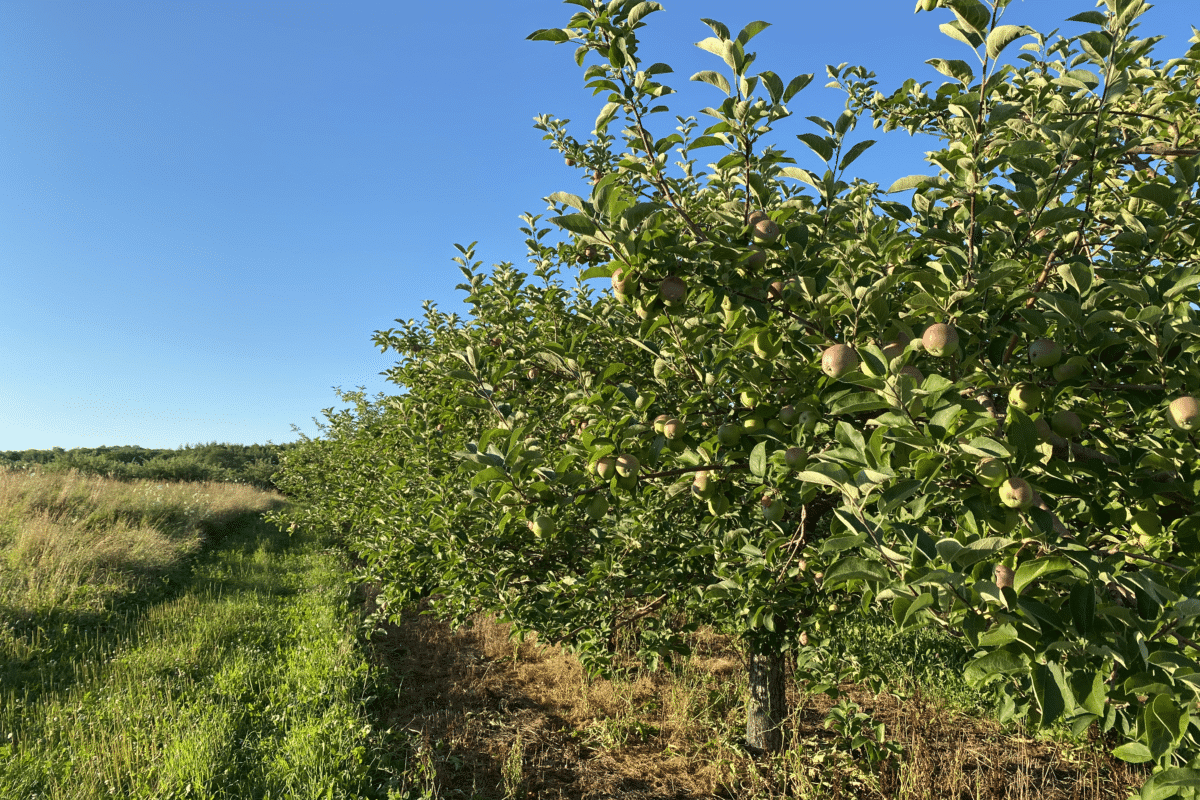
Being an apple farmer is really a labor of love.
It takes patience, knowledge, and a whole lot of tenacity. Before my grandfather passed in the spring of 2019, I remember him talking about caring for the trees. You have to love the trees . That’s what he would always say. Some farms maintain their trees by growing them up on ropes or posts but Fellner Orchards does it the old fashioned way: pruning by hand. Personally, I think that is what makes all the difference.
You rebuild, you plant new trees, and you put in the work to care for them. Sun up to sun down hours are required to keep the crop in full swing.
Trees are living breathing things and they are all connected through their network of roots across the orchard. They all communicate with one another through their roots and it actually has been scientifically proven that trees experience stress and happiness just like any other living creature. My grandfather, and his father before him both knew this fact. My grandfather always treated the trees with love, carefully pruning each branch on each individual tree. My mom told me that she and her siblings could even hear him singing to the trees while he was working in the orchard. Today the farm is run by my uncle, Robert Fellner Jr, and my cousin, Joe Fellner. Where there once was singing, now the giggles and whimsical voices of my two younger cousins ring out as they play in the ancient orchard where winds carry the breezes of primordial knowledge rustling the leaves and Fellner tow-heads, while their dad steps into the shoes of his own father, caring for the orchard and loving the trees and bringing glorious apples to generations of hands across the world. ![]()
